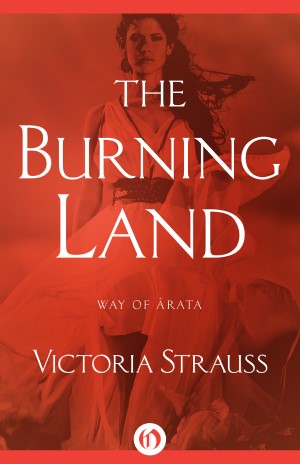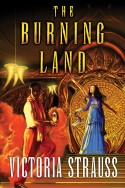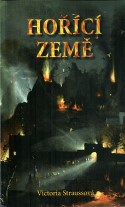The Burning Land
Book 1 of the Way of Arata duology
Open Road Media 2015 (Reissue Edition)
First published by HarperCollins Eos, 2006
Ebook: $7.99
Buy: Amazon / Barnes and Noble / Kobo / iTunes / IndieBound
In a hidden desert sanctuary, the sorcerer-priest of a reborn faith uncovers dark truths about his world and its masters in the first book of The Way of Ârata.
A realm long held in the iron grasp of godless tyrants, Arsace is finally free to worship its beloved, once-outlawed deity, Ârata. But decades of cruelty and oppression have left their mark — evidenced not only by the desecrated Âratist temples throughout the holy city of Baushpar but by the widespread mistrust and suspicion that has lately fallen on the Shapers, the powerful mages whose magic is beholden to no religious or government institution.
Both a Shaper and a deeply devout priest, Gyalo Amdo Samchen has embarked on a great mission into the sacred Burning Land to rescue the renegades who, years before, fled into the desert to escape the city’s madness — among them the Dreamer Axane, who dares not reveal her forbidden visions of a world beyond. But shocking truths await Gyalo in the hidden sanctuary of Refuge — and what he learns there of his quest, his land, its leaders, and its faith will cause him to question everything he fervently believes while providing the terrible spark that could ignite the war to end all wars.
In a magnificent feat of world building, Victoria Strauss has created a unique, vividly imagined land, society, and religious culture while spinning a riveting tale of duty, revelation, destiny, and magic that places her in the top ranks of contemporary fantasists.
Scroll down for an excerpt, or download Chapter 1
Check out Book 2 of The Way of Ârata: The Awakened City
PRAISE
A deeply felt and richly imagined tale that explores issues of faith, destiny and the fallibility of human nature.
– Jacqueline Carey, author of the Kushiel series –
Strauss has created a highly original and complex world. From bedrock to the gods, it sparkles with original ideas. Her plotting is devious and unpredictable and yet never forced, because the characters always act in believable ways, true to themselves.
– Dave Duncan, author of the King’s Blades series –
A most impressive accomplishment–large in scope, unusual in subject matter, literate in style, intelligent and thought-provoking.
– Paula Volsky –
The Burning Land is skillfully crafted, with a soundly-stated central argument: that humankind corrupts the very beliefs it conceives itself to be honoring. This story is also one of a rare type wherein the action takes place chiefly on the minds of the characters; it thus depends for its interest on the ideas to which they give credence, rather than on physical confrontation with other beings. This difference from the usual pattern of a work of fantasy makes Ms. Strauss’ tale even more notable.
– Andre Norton –
The personalities [Victoria Strauss] has built here are so compelling and…the complicated political, religious and social customs so elaborate and well thought out, one can’t help but think—-and after a while, hope-—that The Burning Land is only the first of many.
– January Magazine (Best Fiction 2004) –
[A] perfectly executed fantasy. Ms. Strauss has created a fast-moving and exciting adventure, set in a fantastic and fully realized world full of religious repression, powerful magic, hidden love and dark secrets…With crisp prose, rich characterizations and a compelling plotline, The Burning Land is a thought-provoking, exhilarating novel.
– Writers Write (Best Fantasy/SF/Horror 2004) –
A complex background of history, culture, and religion gives unusual depth to this powerful fantasy of faith and oppression.
– Carolyn Cushman, Locus –
Compelling…thought-provoking. Fantasy can cast new light on our reality, whether it’s a theme of good vs. evil or an exploration of religious truths. Strauss succeeds by wrapping her theology lesson in strong characterization and fine storytelling.
– Cincinnati Enquirer –
An involving novel that shines with intelligence…Combined with a solid plot and Strauss’ crisp, clean and literate prose, this is one of those novels that envelops readers, the kind of book that makes it a pleasure to linger in its imagined world.
– Science Fiction Weekly –
Fluidly written, with in-depth characterization and superb world building, this book comes to a satisfying ending that is open enough to leave a sequel a real possibility.
– VOYA –
Profoundly moving and timely…In this riveting tale filled with magic, intrigue, and treachery, Strauss has succeeded in writing a powerful fantasy novel that is both entertaining and thought provoking. Literary manna.
– Paul Goat Allen, Barnes & Noble Explorations –
Thoroughly engrossing, this thought provoking read harkens back to the 60’s when writers such as Frank Herbert, Roger Zelazny, and Robert A. Heinlein were exploring the nature of religion in science fiction. Strauss does not publish often but her powerful writing seems to gain strength with each book.
– Diana Tixier Herald, Genrefluent –
EXCERPT
After four months of travel, they came to the most hostile landscape they had yet encountered: a vast plain of pebbles packed flat and hard as pavement, polished by time and the elements to the reflectiveness of glass. A wind blew off it, like the breath of a furnace. Even the most desolate of the dunes had supported some vegetation, but there was none here, nor any other sign of life. Far away at the southern horizon, a range of twilight-colored mountains poked up into the sky, some of them showing the flattened cone-shape of volcanoes.
The party made camp, while Teispas dispatched scouts to survey the terrain. They returned exhausted and sunburned, with tales of infernal temperatures and light so intense they had to bind their eyes. They had traveled for two days, and seen no sign of change.
There seemed no choice but to try and go around. To the east the plain curved north, so the party turned west. After a day and a half the plain’s margin dipped sharply south, and the mountains drew closer, revealing fold after fold of fire-colored cliffs descending from their flanks. Now, suddenly, the Dreamers’ Dreams acquired definition, producing an array of symbols that, according to Rikoyu, meant human life and work–still south, somewhere beyond the pebble plain.
They had, it seemed, found the lost Âratists.
But the plain ran on, and scouts sent ahead reported no end in sight. After a week of this, Teispas called a meeting. He and his second in command, Aspâthnes, were present, as were Gyalo, Rikoyu, and Vâsparis. Outside, the sun was slipping over the edge of the world in a glory of gold and orange cloud; its fading light filtered through the canvas of Teispas’s tent, enveloping the men in a ruddy gloom.
“We’re sure now that what we’ve been sent to find lies on the other side of that plain,” Teispas began. “Probably in those mountains. Do you agree, Brother Rikoyu?”
“Yes,” said Rikoyu hoarsely. He looked terrible, his hollow cheeks covered with an unkempt beard, his scalp patchy where skin rashes had caused his hair to fall out.
“But it’s been over a week, and still the plain goes on. And the Dreamers have begun to lose focus again.”
Rikoyu nodded.
“We have supplies for only a year. We’ve been traveling more than four months, and it’ll take us at least that long to return–longer, if the lost Âratists are with us. We have no time to waste. But that is exactly what we’re doing–wasting time. For all we know, this ash-cursed plain goes all the way to the sea.” He paused. Like all of them, he had lost flesh; he had not had much to spare to begin with, and now was gaunt as a ghost, his clothing hanging on him, his skin stretched tight over the bones of his face. With his tangled hair and overgrown beard, he looked like a castaway rather than the leader of a military expedition. “We must try and scout a crossing.”
For a moment there was silence.
“There’s bad places in the Burning Land, but no place crueler than the pebble plains.” Vâsparis sat crosslegged, his hands resting on his knees, self-contained and easy as always. Of all of them, the journey had changed him least, for he had been whip-thin and sun-black long before it began. “There’s a little one west of Thuxra City. My partner and I tried to cross it once, but we had to turn back. ‘Twasn’t for lack of supplies or water–it was the heat. The sun pounds down on those stones till you’d swear you were frying on a griddle.”
“We can travel at night, and take shelter by day.”
“That’s fine for men.” Vâsparis shrugged. “But what about the camels? Nothing for ’em to eat or drink out there. They can go maybe ten days like that–and only if there’s good forage at the end of it.”
“We can’t carry more than ten days’ supply of water in any case,” Teispas said. “So their limit and ours is the same. We’ve seen rain clouds above the mountains–it seems likely there’s good land there. The scouts can try at the most southern point, where the Dreamers’ Dreams were strongest. If they can break through in eight days, it shouldn’t take the main party more than ten.”
“And if the scouts can’t break through?” asked Aspâthnes, Teispas’ second. “Or if they don’t return?”
“Then we’ll move on and try another route. And if that one doesn’t work, another.” Teispas fixed Aspâthnes with a hard black gaze. A strained quality had come upon him over the past weeks, a kind of wire-strung tension, as if the barrier of the plain was finally more than his stoic endurance could support. “And if that one doesn’t work, I’ll concede defeat, and we can go back to slogging along the edge of this bloody plain, until our supply situation forces us to turn tail and go back to Arsace without completing the mission that right now, this moment, is finally within our reach.”
“Very well,” Aspâthnes said. “If the scouts can cross in eight days, and find good land at the exit point, I agree it should be tried.”
“And you, Brother.” Teispas turned that gaze upon Gyalo. “What do you think?”
The question was only a courtesy–Gyalo was in charge of the vowed Âratists, but he had no voice in the mission’s command, and any disagreement would be overruled. But he did not disagree. Since the Dreamers had begun to Dream, a blazing excitement had filled him. He was as impatient as Teispas to break past this final barrier and confront the truth they had sought so long.
“Crossing will be risky,” he said. “But every day we travel the Burning Land is a risk. I agree we should try to find a way.”
“Good.” Teispas’s nod was approving. He looked toward Aspâthnes. “See to it. Two men. They’ll leave this night. We’ll follow in the morning.”
The scouts departed, with four camels and ample water. The main party came on at a slower pace, until they found the red and gold marker the scouts had planted at the point at which they had decided to try a crossing. There was good camping close by, a small oasis where water bubbled up to form a pool and a grove of ghost oaks cast a whispering shade.
The party waited, using the time to patch tents and clothing and repair frayed harness, and to increase their food stores by hunting the large lizards Vâsparis called greenback dragons. On the fifteenth day the scouts emerged, exhausted but triumphant, to report that it had taken them seven nights to reach the far side of the pebble plain, and that verdant land such as they had not seen in all their months of travel waited on the other side.
They set out the night after the scouts’ return. The water barrels were full. Inessential items–spare canvas, clothing, cooking pots, the remaining marker posts–had been unloaded and left behind, and the difference made up with green fodder for the camels, to buy extra crossing time should it be needed.
They rode till dawn beneath the cold-starred sky. The waxing moon stared down, a half-closed eye; around them the plain lay flat and featureless, glistening with reflected moonlight like a plaque of beaten silver. There were no variations, no landmarks, nothing at all with which to measure motion–a monotony as difficult to bear, in its way, as any physical hardship.
At dawn they halted. Looking back, Gyalo could see no trace of their starting point, nor any sign of the land ahead other than the hazy mountains. Tent pegs could not be driven among the packed stones, so they spread the canvas of their tents across the camel-saddles, and beneath this low shelter passed the broiling day. Gyalo dozed and woke and dozed again, tangled in dreams of fire and suffocation. When evening came, the blankets he had lain on were soaked with sweat, and the stone of the plain burned his feet through the soles of his boots.
The camels bore up well for the two nights the fodder lasted, and for two foodless, waterless nights after that. On the fifth night they began to slow, raising the possibility that the journey might take longer than the nine nights Teispas had estimated. The water allowance was reduced (except for the Dreamers, for whom nothing was ever rationed); the thirsty men grumbled, but were not ready to listen to Vâsparis when he suggested, seriously, that they drink their own urine–a survival technique, he claimed, that more than once had made the difference between life and death for him.
At sunset on the seventh night, the travelers crawled from their sweaty burrows to begin the labor of saddling and loading. Gyalo was unhobbling Cirsame–not that she really needed hobbling, for she was by now too depleted to wander–when he heard a shout:
“Look! Over there!”
It was one of the camel handlers. He stood beside the water barrels, pointing south, toward a peculiar disturbance in the sky. Above the plain the air was trembling, shimmering like the heat-haze above a sunstruck rock. The margins of this area were blurred with iridescence.
“What do you think it is?” Sittibaal, who had spread his canvas nearby, came to stand beside Gyalo.
“I don’t know. It reminds me–”
“Of what?”
Gyalo shook his head. What it recalled to him, strangely, was Shaper sight: the air around a substance about to be transformed often looked just so.
Faintly came a long roll of thunder. Storm clouds, thick and gray and turbulent, began to unfold at the disturbance’s center, slowly compounding and enlarging. They pulsed and shook with sullen lightning. A swirling irregularity appeared at the storm’s eastern edge; after a moment a column of cloud slid smoothly downward, like a long black finger. It touched down, lifted, touched again.
“I’ve never seen a storm like that,” Sittibaal said. “Have you?”
“No. No, I haven’t.”
For a while they stood watching as the cloud-finger investigated the ground, sweeping east, then west, then slowly east again, almost as if some invisible hand were shepherding it. At last they returned to their preparations. Gyalo had forced Cirsame to kneel and was loading her when the thunder suddenly boomed louder. He looked up and saw the storm had grown, eating up much of the southern sky. It was still expanding, the clouds swelling, the black column engorging, like a bladder pumped with air–
No–not expanding. Approaching. The storm was coming toward them, racing along the pebble plain at unbelievable speed. In the instant Gyalo realized this, the first winds struck, pressing his clothes against his body, lifting the canvas behind him. The air darkened. Wetness struck his face–rain?
Another clap of thunder split the air. Cirsame bellowed and tried to rise; he pulled her traces, attempting to hold her down. There was a confusion of running men, of shouting–“Bring the camels down! Bring the camels down!” “Hold the canvas!” “The god save us!”–and then the storm struck, a screaming madness of wind and rain. Lightning flashed, blinding; the thunder that followed was like the earth cracking in two. The wind tried to pick Gyalo up; he wound his wrists with Cirsame’s traces and hung on for his life.
There was another flash, another crack. The wind wrenched him savagely around. Pain burst in his shoulder, like nothing he had ever known. Something struck him, crushing him to the ground. And then there was nothing in the world but agony and the storm.
Want more? Download the first chapter
WORLDBUILDING AND BACKGROUND
(These links lead to my old website–use the Back button to return)
Introduction: Building the world of The Burning Land and The Awakened City
Some thoughts on editing: why this book has a prologue (plus a scene that wound up on the cutting room floor)
Maps of Galea and Refuge
Glossary
The Doctrine of Baushpar
The Âratist Scriptures: the Darxasa and the Book of the Messenger
Three Episodes from Âratist History: the spread of the Way of Ârata, the Shaper War, and the Caryaxist Rebellion
Âratist Religious and Monastic Practice
Shapers and Dreamers




